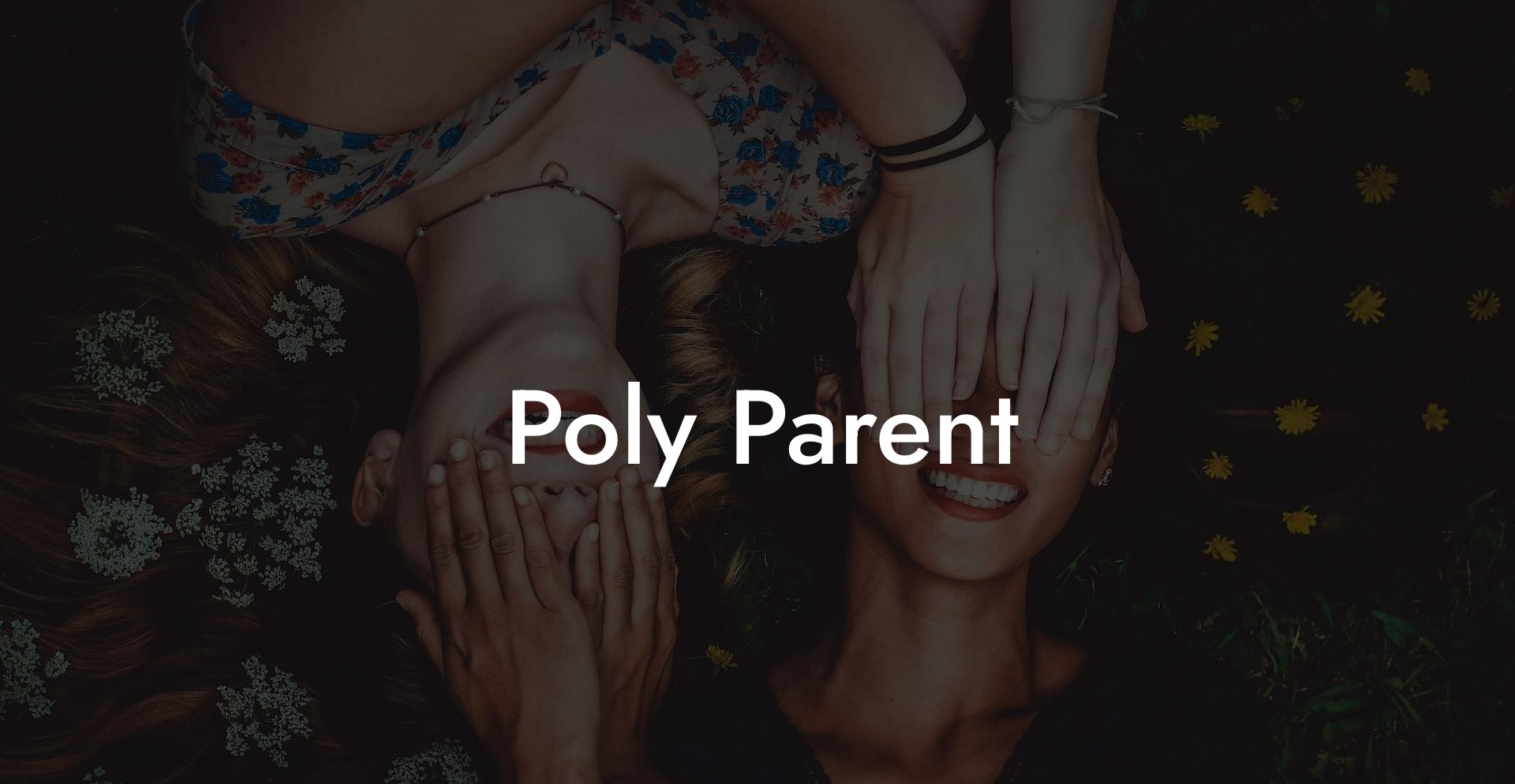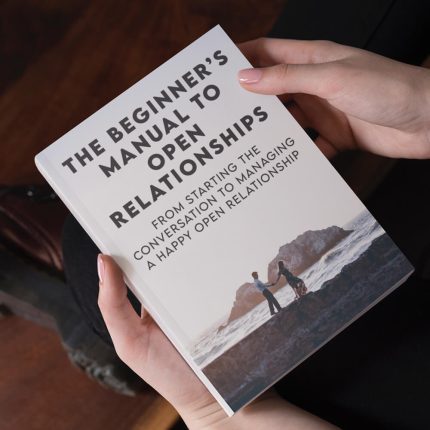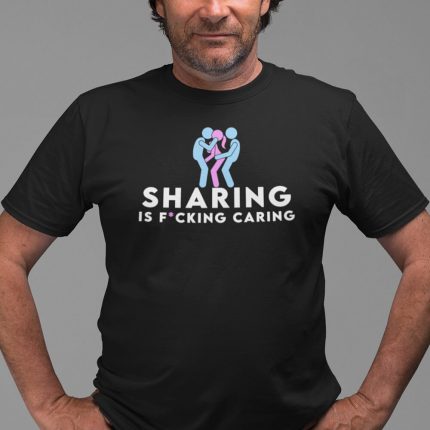Poly Parent

Imagine creating a nurturing environment where parenting is not confined to a traditional nuclear family but is instead enriched by a diverse, supportive network of caregivers and partners. Welcome to Poly Parent—a transformative approach in ethical non monogamy that redefines family and parenting as collaborative, fluid, and empowering. In this model, parenting becomes a shared journey, where multiple adults come together to offer love, guidance, and stability to children, creating a vibrant tapestry of care that transcends conventional boundaries.
Have you ever wondered if monogamy is just a stupid little experiment? Open relationships, polyamory, relationship anarchy...find out which relationship dynamic suits you best with our one minute relationship test. See if you are just conforming to "societal norms". Reveal your truth >>
Quick Links to Useful Sections
- The Ethical Non Monogamy Term: Poly Parent
- What Is Poly Parent?
- Core Principles of Poly Parent
- Historical and Cultural Perspectives on Poly Parent
- From Traditional Family Models to Collaborative Parenting
- Cultural Shifts in Modern Parenting
- Everyday Dynamics of Poly Parent
- Building a Collaborative Parenting Network
- Navigating Complex Dynamics and Individual Autonomy
- Integrating Practical and Emotional Support
- Benefits of Embracing Poly Parent
- Enhanced Emotional Security for Children
- Greater Flexibility and Resilience in Parenting
- Personal Empowerment and Collective Growth
- Improved Communication and Conflict Resolution
- Challenges of Poly Parent
- Managing Complex Group Dynamics
- Balancing Individual Autonomy with Collective Responsibility
- Navigating External Judgment and Societal Norms
- Frequently Asked Questions (FAQ)
- Resources and Community Support: Your Next Steps
The Ethical Non Monogamy Term: Poly Parent
What Is Poly Parent?
Poly Parent is a framework for parenting that embraces ethical non monogamy by allowing multiple adults—whether they are biological parents, step-parents, or close family friends—to participate actively in the upbringing of children. In this model, parenting is seen as a community endeavor, where responsibilities, support, and love are shared among a group of individuals who are committed to the well-being and development of the child. Rather than confining care to one or two figures, Poly Parent recognizes that children can benefit from the wisdom, diversity, and emotional richness of multiple caregivers.
At its core, Poly Parent is built on the principles of consensual collaboration, open communication, and flexible boundary-setting. It challenges traditional notions of the “ideal” family structure by asserting that what matters most is not who is related by blood, but the quality of the nurturing and the support network that surrounds the child. This model is especially appealing to those who value diverse perspectives and believe that shared parenting can lead to more resilient, well-rounded, and empathetic individuals.
Core Principles of Poly Parent
- Consensual Collaboration: All adults involved in the parenting network consciously choose to participate, with each person’s role and responsibilities clearly defined and agreed upon through ongoing dialogue.
- Inclusive Care: Poly Parent values the contribution of every caregiver, regardless of their biological or legal relationship to the child, promoting a diverse and inclusive approach to nurturing.
- Open Communication: Regular, honest discussions are essential for addressing challenges, adjusting responsibilities, and ensuring that everyone’s voice is heard in decisions affecting the child’s upbringing.
- Flexible Boundaries: Recognize that each relationship within the network will evolve over time; boundaries and roles are continuously renegotiated to reflect the changing needs of both the child and the caregivers.
- Mutual Empowerment: Every participant’s strengths and experiences contribute to a collective support system, enhancing the child’s emotional security and promoting personal growth among caregivers.
- Holistic Well-Being: Poly Parent integrates emotional, educational, and practical support, creating a comprehensive framework that addresses the child’s developmental needs on multiple levels.
Historical and Cultural Perspectives on Poly Parent
From Traditional Family Models to Collaborative Parenting
Traditionally, parenting has been depicted as the responsibility of a couple or a single parent, with clear-cut roles based on cultural norms and legal definitions. For much of history, the nuclear family was seen as the ideal unit for raising children, and deviations from this model were often stigmatized or misunderstood. However, as societal values evolved, so too did the concept of family. The rise of feminist movements, social revolutions, and alternative relationship models in the latter half of the 20th century paved the way for more inclusive, flexible approaches to parenting.
EXPLORE OUR ETHICAL NON-MONOGAMY & OPEN RELATIONSHIP SHOP
👨💻👩💻 Digital Store (Instant Download)
🍆💦 Clothing Store (Worldwide Delivery Available)
Multiple Lovers - Sharing Is Caring Unisex T-Shirt (Black)
$29.99Fuck Each Other Not The Planet Unisex T-Shirt (Black)
$29.99Three Isn't a Crowd Unisex T-Shirt (White)
$29.99Sharing Is Caring Daddy Cap (Black)
$39.99Real Men Share Pop Art T-Shirt (Black)
$29.99Sharing Is Caring Unisex T-Shirt (Black)
$29.99Fuck Each Other Not The Planet Unisex T-Shirt (White)
$29.99It's Not Cheating If He Watches T-Shirt (Black)
$29.99Three Isn't a Crowd Unisex T-Shirt (Black)
$29.99I Love Watching Pop Art T-Shirt (White)
$29.99I Love Watching Pop Art T-Shirt (Black)
$29.99Real Men Share Pop Art T-Shirt (White)
$29.99Early advocates of polyamory and ethical non monogamy challenged the assumption that a child’s well-being depended solely on a traditional family structure. They argued that children thrive in environments where care is shared among multiple loving adults who offer varied perspectives and resources. This shift in perspective gave birth to the concept of Poly Parent—a model that reimagines parenting as a communal endeavor, where every caregiver plays a vital role in the child’s development.
Cultural Shifts in Modern Parenting
In today’s globalized, digital age, the definition of family has become increasingly fluid. Modern parents, especially Millennials and Gen-Z, are more open to forming diverse parenting networks that reflect their personal values and lifestyles. Online communities, social media, and progressive parenting blogs have all contributed to the acceptance and popularity of Poly Parent arrangements. These platforms provide spaces for individuals to share their experiences, challenges, and successes, fostering a sense of belonging and mutual support among non-traditional families.
Contemporary discussions emphasize that the essence of parenting lies not in rigid structures but in the quality of care and the emotional security provided to children. Poly Parent embodies this philosophy by advocating for a nurturing network of caregivers who are committed to the holistic development of the child, regardless of traditional labels.
Everyday Dynamics of Poly Parent
Building a Collaborative Parenting Network
Embracing Poly Parent in your daily life means actively cultivating relationships with multiple caregivers who share a common vision for the child’s well-being. This might involve:
- Regular Family Meetings: Schedule routine gatherings—whether in person or virtually—where all caregivers discuss the child’s progress, address challenges, and plan for upcoming needs or events.
- Shared Responsibilities: Clearly delineate roles and tasks, ensuring that each caregiver contributes according to their strengths, whether it’s providing emotional support, managing educational activities, or handling practical day-to-day needs.
- Open Communication Channels: Use group chats, shared calendars, and digital forums to maintain continuous dialogue, coordinate schedules, and ensure that everyone remains informed and engaged.
- Collaborative Decision-Making: Involve all caregivers in important decisions regarding the child’s upbringing, fostering a sense of collective ownership and mutual respect.
Navigating Complex Dynamics and Individual Autonomy
One of the key challenges of Poly Parent is balancing the collective needs of the network with individual autonomy. Each caregiver is a unique individual with their own responsibilities, emotions, and life circumstances. Maintaining a harmonious dynamic requires ongoing negotiation and flexibility.
- Individual Check-Ins: Supplement group meetings with one-on-one conversations to address personal concerns and ensure that your individual needs are being met.
- Flexible Boundaries: Regularly review and adjust boundaries to reflect the evolving needs of both the child and the caregivers, ensuring that personal autonomy is respected within the collective framework.
- Self-Care Practices: Prioritize self-care and encourage all caregivers to do the same. A well-supported individual contributes more effectively to the collective.
Integrating Practical and Emotional Support
Poly Parent is not only about emotional connection—it also encompasses practical aspects of parenting. A robust network of caregivers can provide comprehensive support that covers everything from financial stability to logistical assistance and educational guidance.
- Resource Sharing: Pool resources such as time, money, skills, and knowledge to create a more stable and enriching environment for the child.
- Mutual Assistance: Develop a system where caregivers can rely on one another during emergencies, busy periods, or times of stress, ensuring that the child’s needs are always met.
- Emotional Nurturing: Foster an atmosphere of love, understanding, and shared responsibility, where every caregiver contributes to the child’s emotional growth and well-being.
Benefits of Embracing Poly Parent
Enhanced Emotional Security for Children
One of the greatest benefits of Poly Parent is the robust support system it creates for children. With multiple caregivers offering love and guidance, children often experience a heightened sense of security, belonging, and resilience.
- Multiple Role Models: Exposure to diverse perspectives and experiences helps children develop a well-rounded understanding of relationships, empathy, and self-worth.
- Increased Stability: A network of caregivers can provide consistent support during times of change, ensuring that the child always has a safety net of love and care.
Greater Flexibility and Resilience in Parenting
Poly Parent allows for a flexible approach to raising children, where the burden of parenting is shared among several adults. This collective approach can lead to more resilient family dynamics, as each caregiver contributes their unique strengths and resources.
- Adaptive Support: As challenges arise, the collective network can adapt to provide the necessary support, reducing stress on any single individual.
- Collaborative Growth: The ongoing exchange of ideas and experiences among caregivers fosters continuous improvement in parenting strategies, benefiting both the child and the adults involved.
Personal Empowerment and Collective Growth
For caregivers, Poly Parent offers a sense of empowerment and shared responsibility. It reinforces the idea that parenting is a communal journey, where every contribution is valued, and collective growth leads to a richer, more fulfilling life for all.
- Self-Awareness: Regular reflection on your role within the network helps you grow personally and become a more effective, empathetic caregiver.
- Mutual Empowerment: When every member of the network feels supported and empowered, the entire community thrives, creating a positive cycle of shared growth and resilience.
Improved Communication and Conflict Resolution
The collaborative nature of Poly Parent necessitates and fosters open, honest communication. This proactive dialogue not only prevents misunderstandings but also provides effective strategies for resolving conflicts constructively.
- Transparent Dialogue: Regular, structured conversations help ensure that every caregiver’s voice is heard and that issues are addressed promptly.
- Empathetic Resolution: Open communication paves the way for empathetic conflict resolution, strengthening the bonds within the network.
Challenges of Poly Parent
Managing Complex Group Dynamics
With multiple caregivers involved, navigating the dynamics of a Poly Parent network can be challenging. Differences in parenting styles, communication approaches, and personal boundaries may lead to conflicts or misunderstandings.
- Tip: Foster a culture of regular, open dialogue to address issues as they arise and to maintain alignment among all caregivers.
- Tip: Use conflict resolution techniques that emphasize empathy, active listening, and collaborative problem-solving.
Balancing Individual Autonomy with Collective Responsibility
Ensuring that your personal needs as a caregiver are met while contributing to the collective can be difficult. Some individuals may struggle to balance their own well-being with the demands of the network.
- Tip: Set clear boundaries that allow for personal space and self-care, and communicate these openly with the network.
- Tip: Engage in both individual and group check-ins to ensure that everyone’s needs are addressed without compromising the collective dynamic.
Navigating External Judgment and Societal Norms
Despite growing acceptance of non-traditional family models, Poly Parent arrangements may still face external criticism or misunderstanding from those who adhere to conventional family structures.
- Tip: Build a supportive community of like-minded individuals who validate and celebrate your chosen family structure.
- Tip: Focus on the positive impact your network has on the well-being of everyone involved, and let external opinions take a backseat.
Frequently Asked Questions (FAQ)
1. What is Poly Parent in ethical non monogamy?
Poly Parent is a parenting model within ethical non monogamy that involves multiple adults sharing the responsibilities and joys of raising children. It emphasizes collaborative caregiving, open communication, and mutual support.
2. How does Poly Parent differ from traditional parenting?
Unlike traditional models that rely on one or two parents, Poly Parent involves a network of caregivers who may be biological parents, step-parents, or chosen kin, working together to provide a diverse and resilient support system for children.
3. What are the core principles of Poly Parent?
Core principles include consensual collaboration, inclusive care, open communication, flexible boundaries, mutual empowerment, holistic well-being, and resilience through unity.
4. How can I start building a Poly Parent network?
Begin by identifying individuals who share your values and vision for collaborative parenting. Engage in open discussions, plan regular gatherings, and use digital tools to coordinate responsibilities and share resources.
5. What benefits does Poly Parent offer for children?
Benefits include exposure to diverse role models, a robust support network, increased emotional security, and a more adaptable, inclusive environment that fosters resilience and personal growth.
6. What benefits does Poly Parent offer for caregivers?
Caregivers enjoy shared responsibilities, reduced stress, increased support, opportunities for personal growth, and the empowerment that comes from being part of a nurturing, collaborative community.
7. What challenges might I face with Poly Parent?
Challenges can include managing complex group dynamics, balancing individual autonomy with collective needs, and navigating external societal judgment.
8. How important is communication in a Poly Parent network?
Communication is vital—it ensures that every caregiver’s voice is heard, that boundaries are respected, and that the network remains adaptable and supportive.
9. Can Poly Parent coexist with traditional family structures?
Yes, Poly Parent can coexist with traditional models, but it is defined by its emphasis on chosen kinship and collaborative caregiving rather than solely on biological or legal ties.
10. How do adaptive boundaries contribute to the success of Poly Parent?
Adaptive boundaries allow the network to evolve naturally as individual needs change, ensuring that relationships remain healthy, respectful, and supportive over time.
11. What role does self-reflection play in Poly Parent?
Self-reflection helps you understand your emotional needs and growth as a caregiver, ensuring that you can contribute effectively to both your personal well-being and the collective network.
12. Where can I find additional resources on Poly Parent and ethical non monogamy?
Additional resources include books like The Ethical Slut by Dossie Easton & Janet Hardy, podcasts such as Multiamory, and online communities like r/polyamory that offer insights and guidance on collaborative parenting.
Resources and Community Support: Your Next Steps
- The Ethical Slut by Dossie Easton & Janet Hardy – A seminal work that explores ethical non monogamy and provides practical strategies for building a supportive, inclusive Poly Parent network.
- Podcasts: Listen to Multiamory and similar podcasts for personal stories, expert advice, and creative ideas on managing collaborative parenting arrangements.
- Online Communities: Join forums like r/polyamory to connect with others who practice Poly Parent, share experiences, and gain support.
- Workshops and Webinars: Attend events on relationship psychology, ethical non monogamy, and collaborative parenting to deepen your understanding and expand your support network.
- Therapy and Counseling: Consider professional guidance if you need help navigating complex emotions or managing the dynamics of a multi-adult caregiving network.
By engaging with these resources and incorporating the practical strategies outlined in this guide, you can fully embrace Poly Parent as a transformative approach to caregiving. Celebrate the beauty of shared responsibility, nurture a diverse network of support, and let your chosen family flourish into a resilient, loving community that empowers every member to thrive.
EXPLORE OUR ETHICAL NON-MONOGAMY & OPEN RELATIONSHIP SHOP
👨💻👩💻 Digital Store (Instant Download)
🍆💦 Clothing Store (Worldwide Delivery Available)
Fuck Each Other Not The Planet Unisex T-Shirt (Black)
$29.99I Love Watching Pop Art T-Shirt (White)
$29.99Sharing Is Caring Unisex T-Shirt (Black)
$29.99Real Men Share Pop Art T-Shirt (White)
$29.99Three Isn't a Crowd Unisex T-Shirt (Black)
$29.99I Love Watching Pop Art T-Shirt (Black)
$29.99Multiple Lovers - Sharing Is Caring Unisex T-Shirt (Black)
$29.99Real Men Share Pop Art T-Shirt (Black)
$29.99It's Not Cheating If He Watches T-Shirt (Black)
$29.99Sharing Is Caring Daddy Cap (Black)
$39.99Fuck Each Other Not The Planet Unisex T-Shirt (White)
$29.99Three Isn't a Crowd Unisex T-Shirt (White)
$29.99Lost & confused by all of the terms, types and seemingly made up 3 letter acronyms?? We've got you. Check out our Ethnical Non-Monogamy Dictionary >>
Useful Interruption: Not sure which relationship vibe fits you best? Take our Relationship Test, it’ll give you the real insight into your natural relationship style. Then, dive into our binge-worthy guides (from the tried-and-true to the “wait, that’s a thing?”) and find the perfect relationship type for your life:
- Monogamy
- Open Relationships
- Ethical Non-Monogamy
- Solo Polyamory
- Non-Hierarchical Polyamory
- Hierarchical Polyamory
- Relationship Anarchy
- Swinging
Now back to the main article but yeah take the test...

































